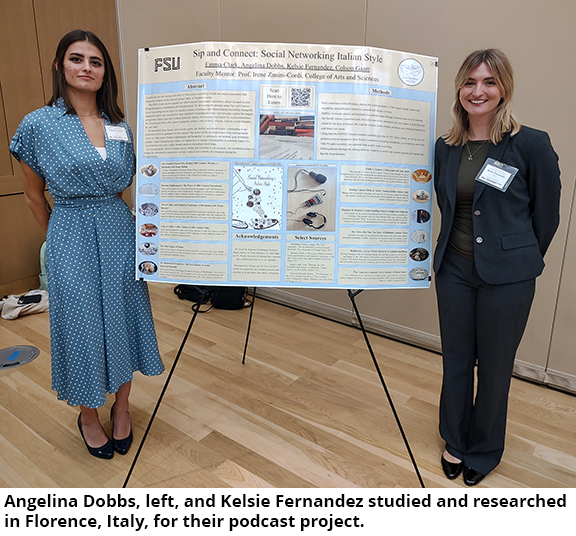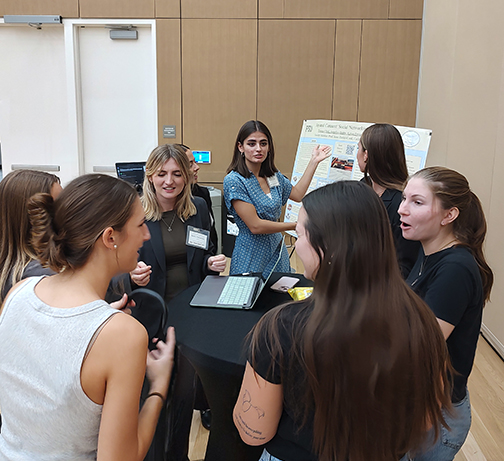Angelina Dobbs and Kelsie Fernandez traveled to Florence for research into their podcast series “Sip and Connect: Italian Style”
By Hanna Rothenberg
Imagine sitting with your closest friends at a quaint café in the heart of Florence, Italy, engaging in lively conversations ranging from academic discussions to casual gossip, while the Florentine locals go by on the sidewalk or street in front of you.
This was not just a daydream for Florida State University English majors Angelina Dobbs and Kelsie Fernandez; this dream became their reality in the form of a research project.
“Downstairs from my apartment where I was living, there was this smaller coffee shop,” Dobbs says, recalling her experience in the country whose history she was researching. “It was more local, and the lady running it knew everyone’s names. They would say, ‘Hey, I want this, this, and this.”
At the time, Dobbs and Fernandez were studying abroad with FSU's International Programs. Using resources from an IDEA Grant, they continued research on their Undergraduate Research Opportunities Program project to hone their knowledge about the social networks that stem from salon culture in the 18th century Enlightenment.
The result was a multi-episode podcast series titled “Sip and Connect: Social Networks Italian Style.” On Oct. 10, they exhibited their poster presentation at the President’s Showcase of Undergraduate Research Excellence.
Dobbs and Fernandez both studied in Florence during the summer of 2024. Dobbs is on the Editing, Writing, and Media track for her major, and Fernandez is in the Literature, Media, and Culture Program. The pair worked on the project with two other FSU students: Colson Gantt, a double major in international affairs and French, and Emma Clark, a double major in political science and philosophy. Read their Honors, Scholars, and Fellows House Blog for more information about each student.
The experience at the President’s Showcase was overwhelming and electric.
“I remember being a UROP student, a year ago, and sitting for the welcome remarks, thinking, ‘That’s never going to be me,’ and now it is,” Dobbs said the night of the showcase.
The students felt a sense of surrealism sharing their project with faculty, students, and, most excitedly, FSU President Richard McCullough and First Lady Jai Vartikar. The first stop McCullough and Vartikar made after the opening introduction was at their poster.
“He had a lot of interesting questions,” Fernandez said, as she reflected on her discussion with the university dignitaries. “And the First Lady asked us, ‘What was the big conclusion that you came across?’”
The four student researchers took the time to explain their research and discuss their realization that women’s power through their social networks in the salon culture of the 18th century connects to women in the 21st century.
I think that the biggest takeaway is that we can learn from these women of the 18th century and kind of apply it to our lives now and leverage our success in the same way
— Kelsie Fernandez
“I think that the biggest takeaway is that we can learn from these women of the 18th century and kind of apply it to our lives now and leverage our success in the same way,” Fernandez added.
Dobbs says her passion for her Italian heritage has driven her curiosity about the culture and language. When Department of Modern Languages and Linguistics Associate Professor Irene Zanini-Cordi introduced Dobbs to her research project based on women’s studies in Italian culture, this interest was further ignited.
Fernandez says she also found her interest in the subject from the focus on women’s studies. She was captivated by Zanini-Cordi’s women-focused project and research, which served as a launching point for the podcast.
When they were in Florence, Dobbs and Fernandez dove deep into the local café scene to enhance their understanding of how social interactions in these spaces shaped cultural norms and influenced the modern-day coffee houses.
Their journey to present their findings and record their podcast episodes began well before they stepped onto the plane. Both joined Zanini-Cordi’s UROP team in the fall of 2023, when studied and researched Italian and social culture in the Enlightenment era.
After landing in Florence, Dobbs says “we saw what we had been learning about in our UROP project, which is where this all started… saw it playing out in real life.”
This foundational research blossomed into the podcast, allowing them to connect their scholarly work and experience in Italy. Fernandez and Dobbs relied on their strong academic background in their English majors when forming ideas and conducting research. They engaged in extensive exposure to the subject matter to build a robust understanding of the 18th century.
This exploration built the foundation for more specific research that was to come. Fernandez faced the challenge of learning about Italian history without prior academic experiences with the subject matter, which drove her determination to become more knowledgeable on the subject.
 Dobbs and Fernandez experienced first-hand the vibrant atmosphere of Italian coffee houses that they had only previously read about. Those environments contrasted drastically with American coffee shops, which are often viewed as quiet workspaces.
Dobbs and Fernandez experienced first-hand the vibrant atmosphere of Italian coffee houses that they had only previously read about. Those environments contrasted drastically with American coffee shops, which are often viewed as quiet workspaces.
The pair’s observations led them to understand how many people in Italy seem to be connected to each other rather than to the internet—even noting how easy it was to identify an American in one of the cafes: find the person with a laptop in front of them.
When working with their group for their UROP project, Zanini-Cordi wanted them to feel immersed in the salon culture from the beginning. Their weekly meetings would be modeled after a salon, where they collaborated and conversed on their research. Although Dobbs and Fernandez became more knowledgeable about the Italian salon culture of the 18th century, they understood that their podcast listeners and the general public did not share the same insights. They took care to translate complex historical concepts into relatable terms for their audience, drawing from previous situations when they were learners.
“I was the broad audience when I didn’t know anything about 18th century Italy and when I was trying to understand,” Dobbs explains, relating to their experience.
Although they spent many hours researching the subject, there was a learning curve of accessing resources in Italian and needing to understand the terminology in English. They point out that dedication to clarity and engagement was crucial in bridging the gap between their research and the public.
Those experiences not only enriched their academic pursuits and aided in their research project, they say, but also deepened their understanding of a culture that had become integral to their studies. They ultimately returned to the U.S. with newfound perspectives on both the city and themselves.
For anyone contemplating studying abroad in Florence or one of the other FSU International Programs centers, Dobbs and Fernandez have words of advice.
“If it’s financially feasible, you should do it. That’s, we think, the best thing we’ve done at FSU.”
Hanna Rothenberg is an English-Editing, Writing, and Media major, with a minor in communication.
Follow the English department on Instagram; on Facebook; and on X.
